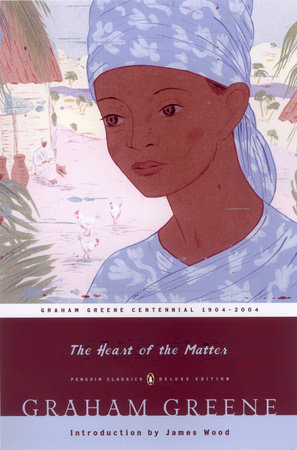The Heart of the Matter Reader’s Guide
By Graham Greene


INTRODUCTION
Set in a small British colonial outpost in Sierra Leone during World War II, The Heart of the Matter occupies and comments on the ambitious subjects of war, espionage, love, adultery, treachery, and betrayal. But at its core—at the heart of The Heart of the Matter —it is a novel of moral dilemmas. Its plot, its psychological and spiritual depth, even its political intrigues turn around two basic moral questions: Is it possible to make others happy? Is suicide ever the right choice? The novel’s enigmatic protagonist, police officer Henry Scobie, even wonders if Christ’s death might be understood as an act of suicide, since He allowed Himself to be sacrificed.
Before he reaches the climactic decision of his own moral crisis, Scobie struggles to make his poetry-loving and deeply unhappy wife, Louise, happy. Fed up with the ghastly climate, the remoteness, and, in her case, friendlessness of village life in Sierra Leone, Louise lets her husband know the full depth of her misery. And Henry Scobie is not a man who can bear the thought that he has caused another to suffer. When he is passed over for the job of Commissioner of Police, Louise feels humiliated in the eyes of the other British officers and their wives, and her unhappiness is brought to a fever pitch. She decides she must leave, and Henry makes a fateful promise to send her to South Africa, even though he lacks the funds to do so.
Thus begins a series of decisions and bargains that push Scobie into a terrifyingly unfamiliar moral terrain. Though Scobie wonders if any human being can arrange another’s happiness and even considers the desire to be happy in a world so filled with pain and suffering to be impossibly foolish, he still tries to make Louise happy. To raise the money to pay for his wife’s passage, Scobie strikes a bargain with Yusef that leads to Scobie’s corruption after many years of honest service. And once Louise is gone, Scobie begins an affair with the recently widowed Helen and soon finds himself responsible for the happiness of two people, rather than just of one. When Louise returns, hoping to restore their strained marriage, she suggests that they receive communion together, which requires a full confession, and the cage door swings shut on Scobie and his deceptions.
Only one way of escape presents itself to Scobie, and he believes that eternal damnation awaits him if he chooses it. But he convinces himself that by sacrificing his own life, he can spare both Helen and Louise further misery at his expense. And it is here that the crucial question of the novel is asked most poignantly: how far should one sacrifice oneself for the happiness of others? Henry Scobie provides one answer but the novel itself leaves the question open for its readers to ponder.
Graham Greene was born on October 2, 1904, in Berkhamstead, England. He attended the Berkhamstead School where his father was headmaster and where, as a consequence, Greene was teased mercilessly by his classmates. At fifteen, he suffered a mental crisis, and after several questionable suicide attempts, ran away from home. In response, his parents sent him to a London psychoanalyst, Kenneth Richmond, who encouraged Greene to write and introduced him to a literary circle that included the poet Walter de la Mare.
Greene went on to Oxford, where he studied modern history and served as editor of The Oxford Outlook. During this period, Greene briefly joined the Communist Party and published a book of poetry, Babbling April. After graduating in 1925, while working as sub-editor for The Nottingham Journal, Greene met his future wife, Vivien Daryrell-Browning, when she wrote to correct some errors concerning Catholicism in his writing. He became a Catholic in 1926, the same year he was appointed sub-editor for The Times in London, and married Vivien a year later. When his first novel, The Man Within, was published in 1929 Greene resigned from the paper to write full time. After struggling to reach a larger audience with his next two books, he achieved great success with Stamboul Train (1932), which was published as Orient Express in the United States.
Greene was impressively prolific during the 1930s, publishing thirteen books—including, Brighton Rock (1938) and The Power and the Glory (1939), which won the Hawthornden Prize. He also traveled extensively to Liberia and Mexico and established himself as a renowned film critic for The Spectator. When World War II broke out, Greene joined the Ministry of Information and in 1941 served as a British Secret Service agent, first in Sierra Leone, an experience he drew upon in writingThe Heart of the Matter (1948), and then for the office of counterintelligence in London.
After the war, Greene collaborated with Carol Reed in writing a film, The Third Man, which won First Prize at Cannes in 1949. In 1955, he wrote The Quiet American, about American involvement in Indochina. More novels followed, including Our Man In Havanna (1958), The Comedians (1966), The Honorary Consul (1973), and The Human Factor (1978), which stayed on theNew York Times bestseller list for six months.
Greene’s marriage was marred by several affairs and the couple separated in 1948 but never divorced. In the last years of his life, Greene lived in Vevey, Switzerland, with his long-time companion Yvonne Cloetta. He died there on April 3, 1991.